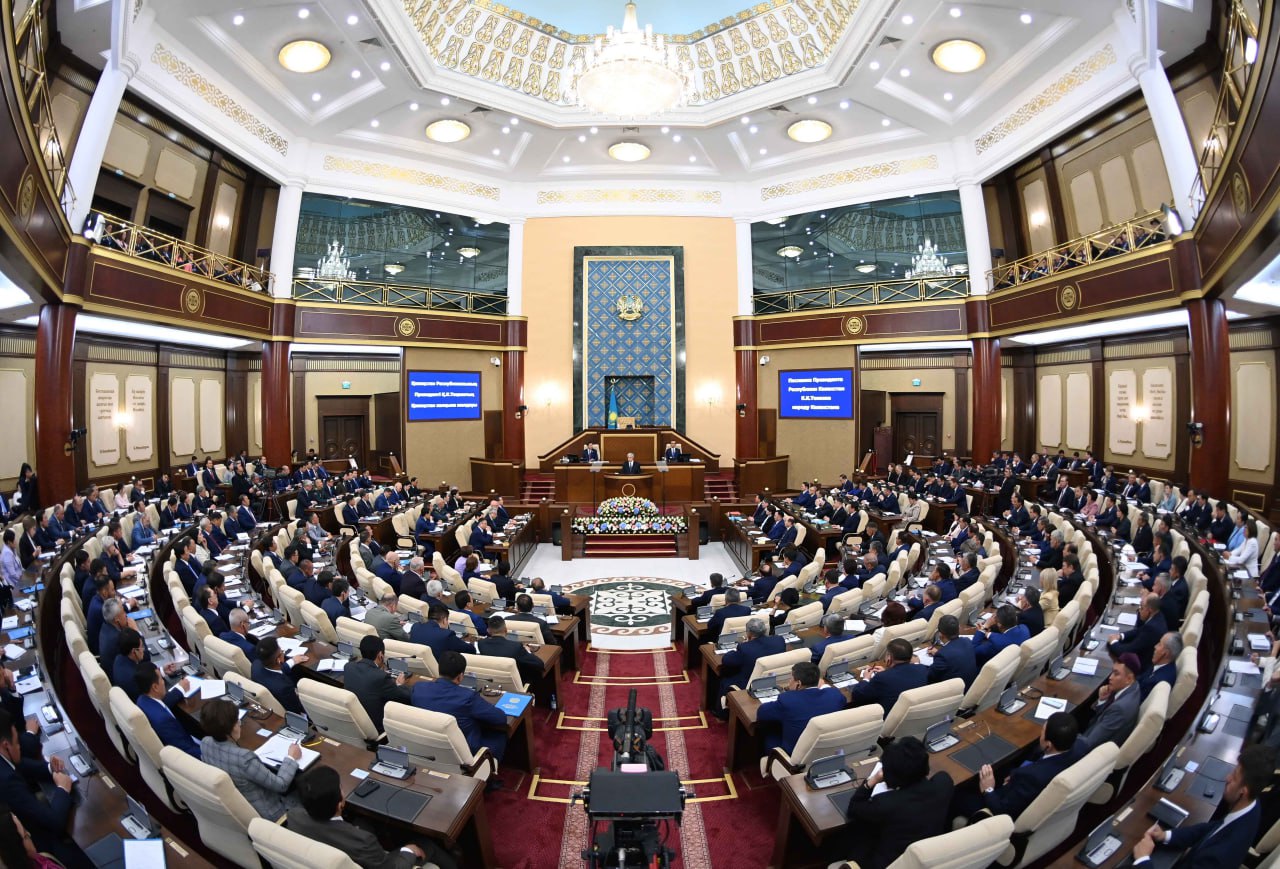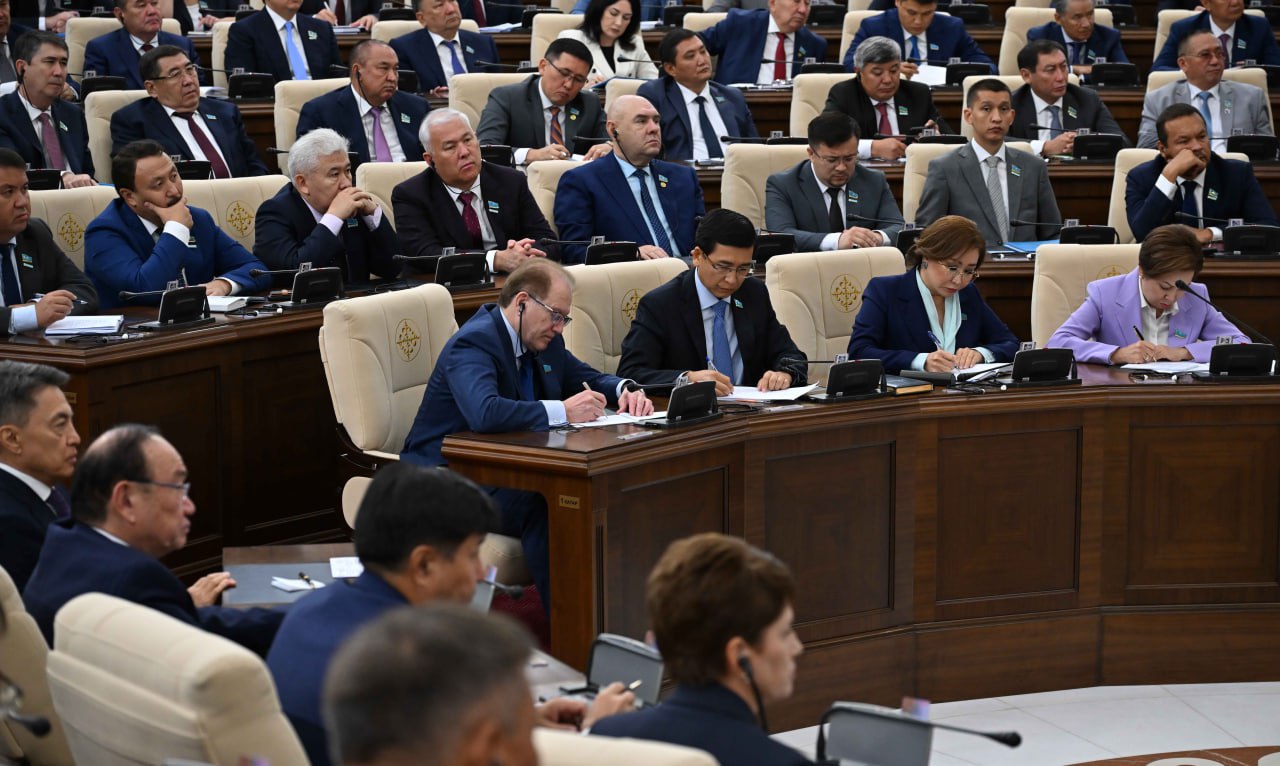ASTANA – President Kassym-Jomart Tokayev urged Kazakhstan to revamp its macroeconomic policy to stimulate investment in his Sept. 1 state-of-the-nation address. Delivered at a joint session of both chambers of the Kazakh Parliament, the speech highlighted economic reform priorities, according to the Akorda press service.

President Tokayev urged Kazakhstan to revamp its macroeconomic policy to stimulate investment in his Sept. 1 state-of-the-nation address. Photo credit: Akorda.
Tokayev attributed the country’s slow economic growth to insufficient investment, noting that last year’s investment in fixed assets was just 15% of GDP.
“The limited involvement of domestic banks in economic development forces the government to engage in direct financing, guarantees, and subsidies, which are costly and counterproductive to market economy principles,” he said.
Corporate lending by banks and investment
Tokayev called for an increase in corporate lending, especially given the substantial profits banks have accrued over recent years.

Photo credit: Akorda.
“The net profit of banks last year was nearly 1.5 trillion tenge ($3.2 billion), and for the first half of this year, over one trillion tenge ($2.2 billion). This is largely due to the high base rate set by the National Bank to combat inflation,” he observed.
He instructed the government and Parliament to explore a more equitable distribution of these profits and called on the Mazhilis, the lower chamber, to revise relevant legislation. The President also criticized the excessive profits financial organizations have made from placing liquidity in non-taxed government assets.
“It’s necessary to encourage banks to engage in corporate lending to support entrepreneurs. I recognize the sensitivity of this issue. I direct the government and financial regulators to provide their conclusive views on this crucial matter within a year. Measures must be taken to integrate banks’ ‘frozen assets,’ totaling 2.3 trillion tenge (US$5 billion), back into the economy. To facilitate this, I instruct the creation of a transparent digital platform where interested businesses can acquire these assets and reintroduce them into the economic cycle,” said Tokayev.
He stressed that despite having 21 banks in Kazakhstan, only a few are investing in economic projects.
“To increase competition, we should attract at least three reliable foreign banks to the country,” he said, adding that annual growth in lending to the real sector should be at least 20%.
National Fund
While acknowledging the National Fund as a financial stability guarantee, Tokayev argued that part of its resources should be allocated to strategic projects shaping Kazakhstan’s future.
“It’s crucial to rigorously vet project proposals to maximize returns from the National Fund,” he said.
The National Fund was established in 2000 to act as a financial cushion, ensuring Kazakhstan’s economic stability amid fluctuations in oil, gas, and metal prices.
Tokayev mentioned another upcoming fund, aimed at accumulating assets reclaimed from corrupt officials. He stated that this fund will serve as a source of “long-term money,” to be used as efficiently and transparently as possible for addressing national issues.
Additionally, the President suggested consolidating the two existing stock exchanges in Kazakhstan, which currently serve similar functions, under unified management. He also stressed the importance of stable payment systems and directed the National Bank to fully implement the National Payment System by 2024.
Region’s budgetary independence
In line with a new economic model outlined in the President’s address, regions are set to gain greater budgetary autonomy. Tokayev directed that a minimum of two trillion tenge (US$4.3 billion) be allocated to the secondary level of the budget. Additionally, he advised reducing the proportion of transfers from the national budget within local budgets to an average of 25%, a decrease from the current 50%.
“I believe that regional akims (governors) should have the authority to independently formulate their budgets. This will expedite the resolution of urgent local issues,” said Tokayev.
Streamlining tax breaks
The President called for a more focused approach to tax breaks to facilitate economic growth. “Taxes that go uncollected represent missed opportunities for building hospitals, roads, and schools. We need to critically assess and reduce the volume of tax incentives by at least 20%. Any remaining tax preferences should be granted based on transparent, general guidelines rather than specific projects or individuals,” Tokayev stated.
Regarding tax administration, Tokayev advocated a shift to a service-oriented model for interactions between tax authorities and taxpayers. “The goal is not to punish, but to warn.” he noted.
Tokayev also proposed fully digitizing tax oversight and decreasing the number of tax reporting forms by 30%. Additionally, he called for reducing the total number of distinct tax categories and other mandatory budget contributions by at least 20%. He suggested that taxes yielding insignificant fiscal returns should be abolished.

